The truce in the trenches - as remembered by Hampshire soldiers
and live on Freeview channel 276
In December 1914 hundreds of Hampshire soldiers were preparing for the first Christmas of the First World War away from their loved ones.
The 1st Battalion of the Hampshire Regiment was stationed on the edge of Ploegsteert on the Franco-Belgian border and had endured heavy rain and tough conditions for weeks.
Advertisement
Hide AdAdvertisement
Hide AdPrivate William Cook said: ‘The weather has been terrible up to Christmas Eve; up to your waist in water in some places, and over the tops of your boots everywhere you step.
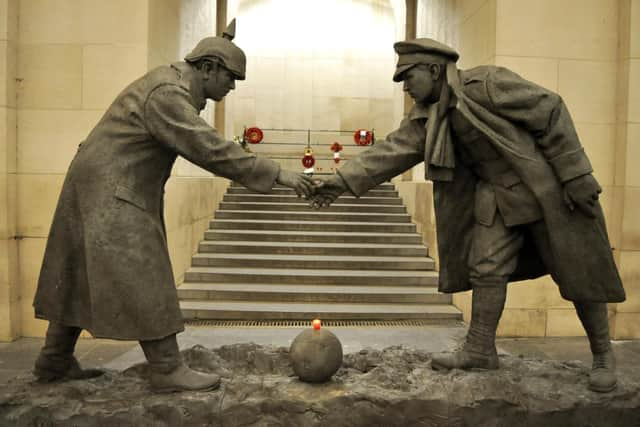

‘But Christmas Day set in with a very hard frost. Everything goes easier when you can get about here.
‘Our regiment is in the most forward trenches in the country, and has stuck to them despite all the efforts of the Prussian Guard or their understudies to shift them, and it is Hell at times, indescribable by pen.’
Bandsman Peter Williams was deployed as a stretcher bearer with the Hampshires and described how the truce came about with the first overtures between enemies taking place on Christmas Eve.
Advertisement
Hide AdAdvertisement
Hide AdHe said: ‘I took over my duty about six o’clock, and, to my surprise, I walked right to the trench without hearing a shot fired. I had not been in the trench long before I heard one of the Germans shout, “Gentlemen, a happy Christmas to you all,” and our boys answered: “The same to you”.
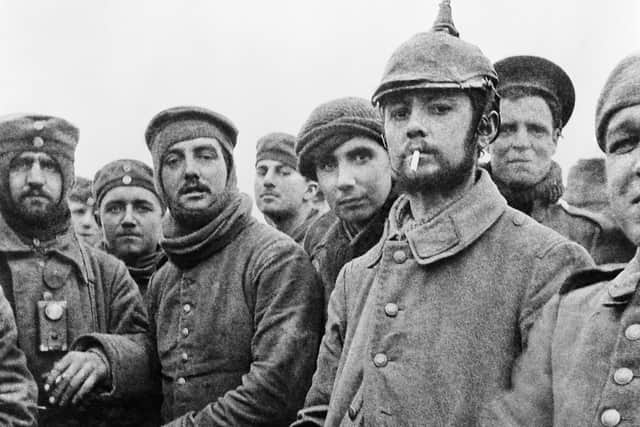

‘They even wanted us to go over and drink their health, but, of course, this was not allowed. All night they were singing, which was grand to hear. I tried to get to sleep, but I couldn’t, so I stood up and had a look at what was going on.
‘One of them gave us a few cornet solos. Some of them were Home, Sweet Home, Nearer, My God, to Thee, and God Save The King, and one of them shouted “What would the Kaiser say if he heard us playing this?” and this is how they carried on all night.’
The following morning Williams was relieved by Bandsman Fred Brewer who had heard the goings-on in the trenches overnight.
Advertisement
Hide AdAdvertisement
Hide AdHe said: ‘On Christmas Eve we heard a lot of shouting and singing in the trenches, and inquiring what it was we found that the lads were wishing the Germans a merry Christmas and just enjoying themselves.
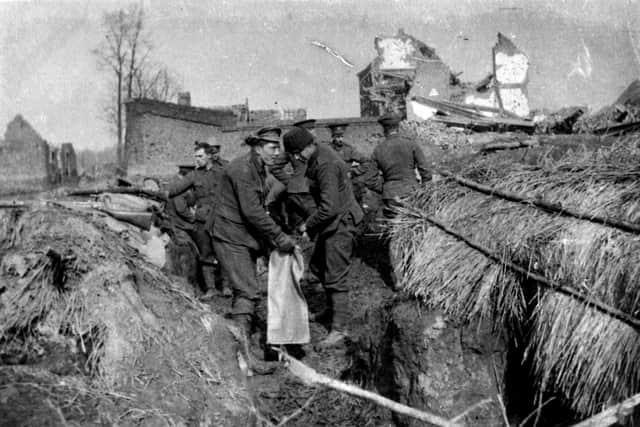

‘When two of my chums went up to relieve the other two that were in the trenches the day before... they found the trenches decorated by Chinese lanterns, and the Germans had a band in their trenches, and the men sang while the band played, and of course our lads had to join in.
‘The singing was lovely, and on Christmas Day the Germans came out of their trenches and walked across towards ours, and the captain of the company went to see what they wanted, and he found that they wanted to have a day’s peace to bury their dead.
‘So they agreed to have a truce for the day, and then the men went out in front of the trench and exchanged cigarettes for cigars, and then some of our stretcher bearers and some of the company men helped them (the Germans) to bury their dead, and after the service the officer that conducted it thanked the English for helping them.
Advertisement
Hide AdAdvertisement
Hide Ad‘So we had an enjoyable time, it was a treat to walk about without having to dodge the bullets and shells.’
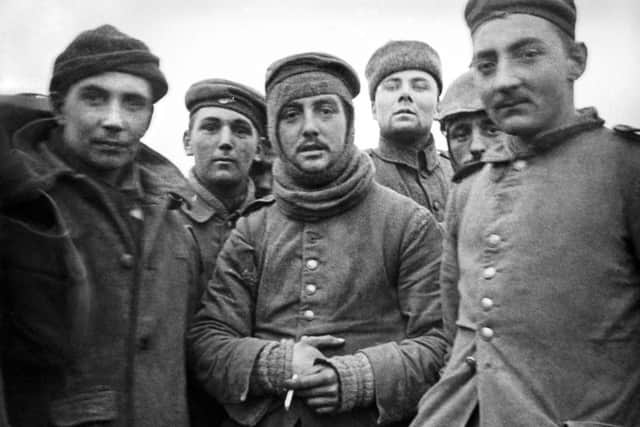

For Pte Cook the Christmas truce was a chance to recover comrades whose bodies had lain in No Man’s Land and both the men of the Hampshires and the enemy carried out a joint burial service after helping each other to retrieve the dead.
He said: ‘The German officer, who spoke a few words of the burial service in German suddenly broke into English, and thanked us English for assisting to collect their dead, and for the truce to bury them on that day.
‘I had several long chats with the Germans, who were composed of odds and ends of regiments. They have been buoyed up with hope from their officers that everything was going well with them, and one told me that the Russian army was a “walk over”.
Advertisement
Hide AdAdvertisement
Hide Ad‘I did my best to enlighten him as to the true state of affairs, and I thought it was going to end up with a scrap between him and me over it, but one of his mates got on to him for arguing with me, and we passed it off by exchanging chocolates and cigarettes with each other.
‘They are a comical looking lot. Some are very young and others are elderly, belonging to the Landsturm. They are nearly fed up with the business, and a good many understand English well, for when we have a shot at one in the trenches, they shout out, ‘Hard lines!’ and signal ‘misses,’ ‘inners’ or ‘magpies’; they also sing all the latest chorus songs.’
After enjoying the festive singing Bandsman Williams missed the fraternisation which followed but still enjoyed his Christmas Day.
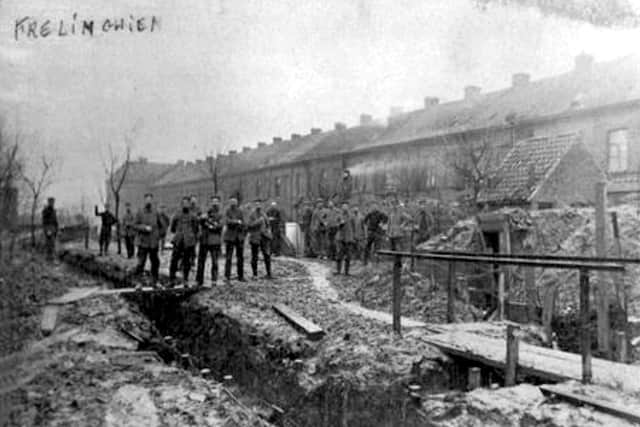

He said: ‘I came out of the trench about five o’clock on Christmas morning, and got back to the headquarters in time to have Christmas dinner, which was very nice, and we had a good old time. We had roast pork and beef, and plenty of Christmas pudding, which we have to thank the people of England for.’
Advertisement
Hide AdAdvertisement
Hide Ad*Christmas Truce by the Men Who Took Part by Mike Hill is available from Fonthill Media fonthill.media/products/christmas-truce-by-the-men-who-took-part-letters-from-the-1914-ceasefire-on-the-western-front and all major retailers.
A message from the editor, Mark Waldron. You can subscribe here for unlimited access to Portsmouth news online - as well as fewer adverts, access to our digital edition and mobile app. Our trial offer starts at just £2 a month for the first two months
Comment Guidelines
National World encourages reader discussion on our stories. User feedback, insights and back-and-forth exchanges add a rich layer of context to reporting. Please review our Community Guidelines before commenting.